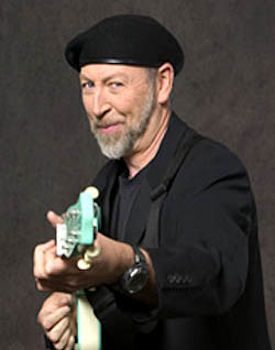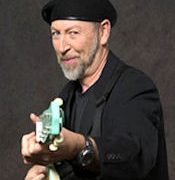Richard Thompson
A Troubadour for All Ages

A Renaissance troubadour with blues and roots rock influences…and a Celtic musical vision with a leaning toward William Blake thrown in. This unique mix would define one artist: Richard Thompson. His successful career dates back to his earliest days with the innovative, original post-British invasion folk, jazz and rock influenced, Fairport Convention. After leaving the band he went on to produce Shoot Out The Lights, one of the strongest albums of the singer-songwriter movement of the early 70s. For the last few decades he has forged a solo career that has been as prolific as it has been rich in the musical textures of Celtic, Blues, Rock and Roll, Jazz, and British &American folk influences. He has been named by Rolling Stone as one of the top 200 guitarist of all time. For good reason. Listening to him play live defies logic: it is hard to tell if this is one man or an entire band. He draws on influences like Django Reinhardt and Les Paul on his instrument, while his songwriting and vocal approach seem to come from no blueprint but his own.
Richard Thompson will be one of the headliners at the June 6 and 7th L.A. Acoustic Music Festival at the Santa Monica Pier this year. In the following interview, we discuss everything from his unique storytelling approach to the Sufi-Muslim influence on his music.
TERRY: A great deal has been said over the years as to what a folk song actually is. How would you define the folk song?
RICHARD: It’s hard to define, actually. If we’re talking about traditional, it’s one thing. Some people look at it as roots music and that’s another. Calling the festival ‘Acoustic Music’ is a good way of putting it so we don’t box it in. Some people feel it’s just that, acoustic music. But, that’s not traditional. I’ve heard it defined as music of the under class, you know, the working people.
TERRY: Often from this emerges storytelling. Folk singers and songwriters have been some of our best storytellers. Can you comment on this?
RICHARD: Absolutely. There’s always been the storyteller through music in one way of another. Some songs actually have structure, a beginning, middle and end. The telling of it can be very economical while itsays a lot. The idea is to get into a person’s head, to see the through their eyes. When I write, I don’t necessarily go with this form. You know, you can just drop right into the middle of the scene and never say anything about the beginning or the end. You just create this one scene.
TERRY: I’ve noticed most of your songs are stories told from the first-person perspective.
RICHARD: Yes. I find this more interesting. You know, the most traditional story songs have been called ballads. These tell a straight story. But, I’ve tried to change that a bit by taking unique perspectives and making the narrative one from inside the character’s head.
TERRY: How do you get the ideas for your songs?
RICHARD: (laughs) I wish I knew! It’s like writing fiction. Sometimes you just have the words and it evolves from there. Sometimes you can see a scene. In fact, this happens a lot of times. The music goes visually and images move from there.
TERRY: I heard a story about a time when Fairport Convention played at The Troubadour during the club’s golden period in the late 60s?
RICHARD: Yes. Yes. When you’d play The Troubadour you were booked for a week. There would be two shows a night for six days. It was perfectly criminal, really. It was our first shows in LA. There was one period where we’d made $2,000.00 in a two weeks and our bar bill was $3,000.00.
TERRY: I heard there was a time when Led Zeppelin sat in with you.
RICHARD: Yes. They came up and joined us on stage. We had a really good time. There are master tapes of that show. They’re missing.
TERRY: Tell me about the Sufi/Islam influence in your music?
RICHARD: Your belief is going to permeate through everything you do. What you believe may come through a story or something in the background. It will express itself. You know, I’ve read a lot of Arab poetry and that’s been an influence.
TERRY: This seems like a good representation of the Muslim world view. Often Islam as whole is confused with Islam extremists.
RICHARD: Yes. Well, there are extremists out there, but they’re a serious minority. But, in Arab countries there is no freedom of speech. They’re a post-colonial government. I think they need a bit of a revolution to bring back stability
TERRY: What is the song, The King of the Bohemians about?
RICHARD: It’s about my daughter. It’s a scene in London unfolding. Some people try to find something in it.
TERRY: It’s like that story telling approach we discussed, coming into the middle of a scene.
RICHARD: Absolutely. That’s it. Some people try to read things into it. Some people think its about Bob Dylan. But, it’s more obscure than that. You just have to listen to the words and picture it. It puts you there into that time and place.
TERRY: Can you tell me some influences?
RICHARD: I have two kinds of playing that are very different. Acoustic and, of course, electric. For acoustic, Bert Jansch really helped me. Doc Watson, also. You know, I started with acoustic guitar at a young age. It helped to be able to get the finger technique going then. There’s also a lot of Scottish influence and Appalachian. As far as electric goes, my start was with jazz. Django and Les Paul were guitar players I heard when I was in my home growing up. A good place to start.
TERRY: How about today’s young songwriters? Who do you hear out there with promise?
RICHARD: There are some really good writers going now. You know, every generation has their great ones. Its easier to see in the acoustic world because the music is clear. With bands it’s harder to get a hold of the actual songwriting. They have so much to do with style first.
TERRY: Can you give me some names?
RICHARD: I knew you were going to ask me that (laughs)? I’m horrible with names! Jackie Greene comes to mind. He’s great. He has the Dylan-Blonde on Blonde style. He’s a very charismatic performer.
TERRY: We’ll have to be sure he reads this interview.
RICHARD: Oh no!
TERRY: I think that wraps it up. We’re looking forward to seeing you at the festival.
RICHARD: Yes. I’m looking forward to it too. It’ll be a nice time.
Terry Roland is an English teacher, freelance writer, occasional poet, songwriter and folk and country enthusiast. The music has been in his blood since being raised in Texas. He came to California where he was taught to say ‘dude’ at an early age.
Richard Thompson
A Troubadour for All Ages













